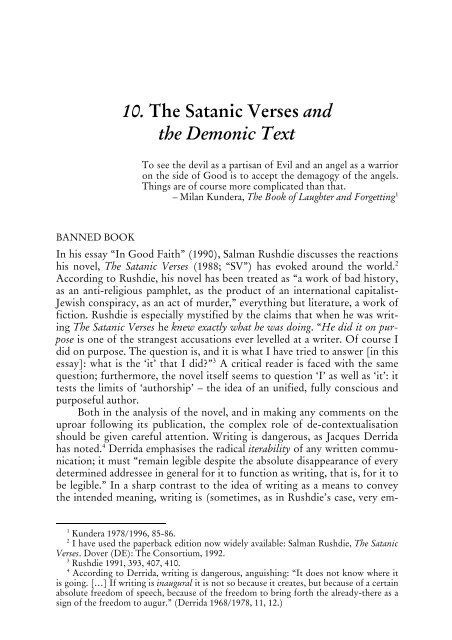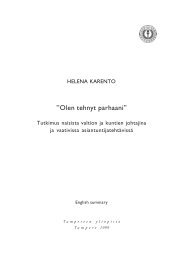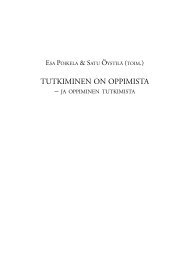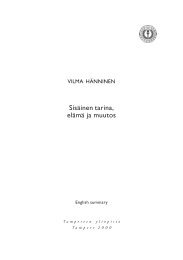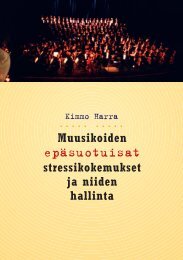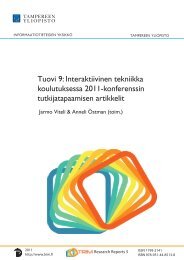Note on this edition: this is an electronic version of the 1999 book ...
Note on this edition: this is an electronic version of the 1999 book ...
Note on this edition: this is an electronic version of the 1999 book ...
Create successful ePaper yourself
Turn your PDF publications into a flip-book with our unique Google optimized e-Paper software.
10. The Sat<strong>an</strong>ic Verses <strong>an</strong>d<strong>the</strong> Dem<strong>on</strong>ic TextTo see <strong>the</strong> devil as a part<strong>is</strong><strong>an</strong> <strong>of</strong> Evil <strong>an</strong>d <strong>an</strong> <strong>an</strong>gel as a warrior<strong>on</strong> <strong>the</strong> side <strong>of</strong> Good <strong>is</strong> to accept <strong>the</strong> demagogy <strong>of</strong> <strong>the</strong> <strong>an</strong>gels.Things are <strong>of</strong> course more complicated th<strong>an</strong> that.– Mil<strong>an</strong> Kundera, The Book <strong>of</strong> Laughter <strong>an</strong>d Forgetting 1BANNED BOOKIn h<strong>is</strong> essay “In Good Faith” (1990), Salm<strong>an</strong> Rushdie d<strong>is</strong>cusses <strong>the</strong> reacti<strong>on</strong>sh<strong>is</strong> novel, The Sat<strong>an</strong>ic Verses (1988; “SV”) has evoked around <strong>the</strong> world. 2According to Rushdie, h<strong>is</strong> novel has been treated as “a work <strong>of</strong> bad h<strong>is</strong>tory,as <strong>an</strong> <strong>an</strong>ti-religious pamphlet, as <strong>the</strong> product <strong>of</strong> <strong>an</strong> internati<strong>on</strong>al capital<strong>is</strong>t-Jew<strong>is</strong>h c<strong>on</strong>spiracy, as <strong>an</strong> act <strong>of</strong> murder,” everything but literature, a work <strong>of</strong>ficti<strong>on</strong>. Rushdie <strong>is</strong> especially mystified by <strong>the</strong> claims that when he was writingThe Sat<strong>an</strong>ic Verses he knew exactly what he was doing. “He did it <strong>on</strong> purpose<strong>is</strong> <strong>on</strong>e <strong>of</strong> <strong>the</strong> str<strong>an</strong>gest accusati<strong>on</strong>s ever levelled at a writer. Of course Idid <strong>on</strong> purpose. The questi<strong>on</strong> <strong>is</strong>, <strong>an</strong>d it <strong>is</strong> what I have tried to <strong>an</strong>swer [in <strong>th<strong>is</strong></strong>essay]: what <strong>is</strong> <strong>the</strong> ‘it’ that I did?” 3 A critical reader <strong>is</strong> faced with <strong>the</strong> samequesti<strong>on</strong>; fur<strong>the</strong>rmore, <strong>the</strong> novel itself seems to questi<strong>on</strong> ‘I’ as well as ‘it’: ittests <strong>the</strong> limits <strong>of</strong> ‘authorship’ – <strong>the</strong> idea <strong>of</strong> <strong>an</strong> unified, fully c<strong>on</strong>scious <strong>an</strong>dpurposeful author.Both in <strong>the</strong> <strong>an</strong>alys<strong>is</strong> <strong>of</strong> <strong>the</strong> novel, <strong>an</strong>d in making <strong>an</strong>y comments <strong>on</strong> <strong>the</strong>uproar following its publicati<strong>on</strong>, <strong>the</strong> complex role <strong>of</strong> de-c<strong>on</strong>textual<strong>is</strong>ati<strong>on</strong>should be given careful attenti<strong>on</strong>. Writing <strong>is</strong> d<strong>an</strong>gerous, as Jacques Derridahas noted. 4 Derrida emphas<strong>is</strong>es <strong>the</strong> radical iterability <strong>of</strong> <strong>an</strong>y written communicati<strong>on</strong>;it must “remain legible despite <strong>the</strong> absolute d<strong>is</strong>appear<strong>an</strong>ce <strong>of</strong> everydetermined addressee in general for it to functi<strong>on</strong> as writing, that <strong>is</strong>, for it tobe legible.” In a sharp c<strong>on</strong>trast to <strong>the</strong> idea <strong>of</strong> writing as a me<strong>an</strong>s to c<strong>on</strong>vey<strong>the</strong> intended me<strong>an</strong>ing, writing <strong>is</strong> (sometimes, as in Rushdie’s case, very em-1 Kundera 1978/1996, 85-86.2 I have used <strong>the</strong> paperback editi<strong>on</strong> now widely available: Salm<strong>an</strong> Rushdie, The Sat<strong>an</strong>icVerses. Dover (DE): The C<strong>on</strong>sortium, 1992.3 Rushdie 1991, 393, 407, 410.4 According to Derrida, writing <strong>is</strong> d<strong>an</strong>gerous, <strong>an</strong>gu<strong>is</strong>hing: “It does not know where it<strong>is</strong> going. […] If writing <strong>is</strong> inaugural it <strong>is</strong> not so because it creates, but because <strong>of</strong> a certainabsolute freedom <strong>of</strong> speech, because <strong>of</strong> <strong>the</strong> freedom to bring forth <strong>the</strong> already-<strong>the</strong>re as asign <strong>of</strong> <strong>the</strong> freedom to augur.” (Derrida 1968/1978, 11, 12.)


